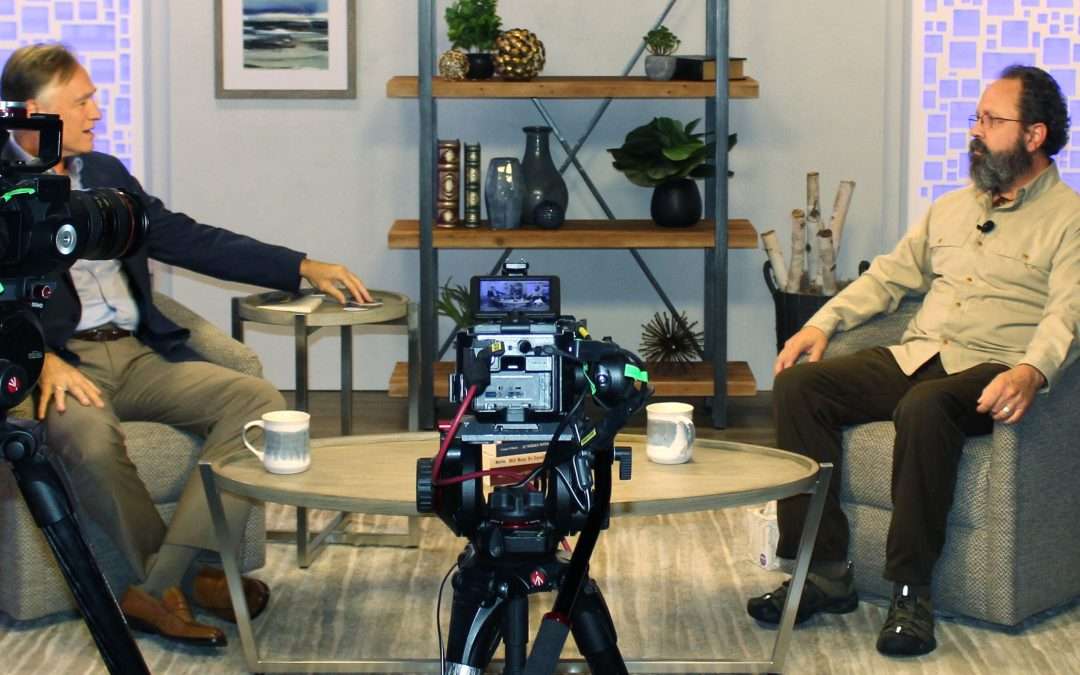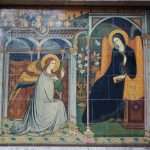The following article is condensed from an interview between Peter Herbeck and Dan Burke, the founder and president of the Avila Institute for Spiritual Formation, that originally appeared on the 2021 season of The Choices We Face. You can view The Paradigm of Ascent episode on our YouTube channel.
Peter Herbeck (PH): Why did you write a book on spiritual warfare (Spiritual Warfare and the Discernment of Spirits)?
Dan Burke (DB): I’ve been involved with exorcism ministry, which is on the rise. There’s always an ebb and flow across history, when the enemy has more or less power. Now it’s more. Exorcisms are taking longer. More people are struggling in that, and more lay people are working in deliverance ministry. I felt it was time to equip people in a very practical way, which is my realm of writing, to equip people with the knowledge of how to stay out of the need to go see an exorcist.
I also want to help people understand how to listen to the Holy Spirit and how to better understand the influences coming against them. I tell my students, “All the thoughts in your head are not yours, and you should not listen to them.” That idea is very liberating.
PH: That’s a radical thought.
DB: It is. During the last class I taught, a woman said, “I’ve been in depression for thirty years, and this course delivered me.” She realized she was being externally influenced. She said, “I was giving into those thoughts. Before, I thought that since this was how I felt, it was me.” Jesus spoke of this when He read that passage from the Old Testament about setting the captives free (see Isaiah 61:1-3). This changed the way she thought about her oppression, and then she began to practice the battle against it, which is what St. Ignatius taught. She began to cooperate with the Lord, and He is always so generous to those who begin the healing process. It gets harder later. But instantly, she was delivered of that depression.
There are a lot of people who are not depressed but don’t realize they have anxiety, fear, doubt, despair, tepidity, timidity, cowardice, whatever it is, and of course, in our difficult times, that’s easy to come by.
PH: I battle with some of those very things.
DB: You do? You’re supposed to be perfectly confident, and yet, you’re human.
PH: Exactly. It’s the battle. We’re living in spiritual warfare, and heightened combat is going on. There is a madness in society that fills people with anxiety and confusion. I remember hearing years ago that demons are like rats, and they cling to garbage. Many of us carry wounds, which is the place where the enemy wants to attach to places of vulnerability and weakness.
One of the reasons I love Spiritual Warfare and the Discernment of Spirits so much—there’s many reasons—is that it’s timely and it’s written in a way that is very accessible and gets right to the heart of the matter.
I’d love to read where you describe your early experience. It grabbed my heart right from the start:
“Scene 1: Screaming, rage, another full-volume and frightening argument, and then boom! dead silence. A gunshot. I was only nine, but I knew what it was. My two younger brothers and I huddled at the bottom of the stairs, frozen with terror in the eternal silence. Was my mother dead? Would he kill us next? I couldn’t move, or run, or think. It seemed like an eternity before we discovered what had happened—although we never really learned the full story.”
Help us understand what’s happening there.
DB: That was tough to reveal. My step-father was a man of rage, alcoholism, and abuse; that’s part of the story of what I grew up in. People think, “You have it all together. You’re running this big ministry, and you influence so many people.” They don’t realize that I’m just a broken little Jewish boy who God is trying to get out of the way to use. We all have struggles, and I’m not speaking from a high tower, as though I’ve got it all together and want to tell you how to run your life.
I come out of brokenness. Jesus has radically healed me and transformed my life—through the wisdom of the Church and personal relationship with Him. I want people to know—if I can get free, anyone can get free. That’s an important message. Based on where I came from, from abuse, if I can have peace, anyone can have peace. If I can live in joy and not be a victim, anyone can be free.
PH: This is an important truth for moving forward for anybody in leadership today in the Church. We have to tell the truth about our own lives and the reality of the struggle. We don’t have to feel like we have to project an image of perfection; so many people who hear us might end up thinking, “Well, that might be right, but they don’t have my history.” They’re caught in the lie of thinking that, “My history determines my destiny.” They get stuck in shame and fear, thinking, “What I’m hearing can never be real for me.”
We need leadership that will help disarm that. There’s a beautiful and simple process you follow as you come out of that over time.
DB: I came to Christ around age twenty out of despair. Rationally, for me, it was a bullet to the head or a reason for suffering. That was the equation, and I was ready to do one or the other. The Holy Spirit said, “This is a better way.” And I began to figure it out. I came to Christ and read and memorized the New Testament. As I was reading, Jesus was saying, “My peace I leave you, my peace I give you, not as the world gives do I give to you. Let not your heart be troubled, neither let it be afraid (Jn 14:27).
I thought, “I’ve come to Jesus, but my heart is troubled. I have hope, but I don’t have peace.” And He said, “Come to Me all you who are weary and heavy-laden, and I will give you rest” (Mt 11:28). I didn’t have rest. I had a reason to live, but I was wrestling with, “What is this peace? What is this joy?”
I began to read the New Testament. Romans 12:2 says, “Be not conformed to this world but be transformed by the renewing of your mind.” The Greek word for “transformed” is metamorphosis, caterpillar to butterfly. St. Paul teaches us where the battle is: “We war not against flesh and blood but against principalities and powers” (Eph 6:12). The battleground is the mind. The enemy creates fortresses of lies and tries to take up an abode, and our job is to destroy those strongholds. Take every thought captive to the obedience of Christ. I outline that process in the book. That’s the process I went through to get free.
PH: “Destroy arguments and every proud obstacle to the knowledge of God” (2 Cor 10:5). What does that mean?
DB: We believe lies. When I was a little kid—a good, compliant, happy kid, which got wrecked pretty quickly—I overheard my mother telling a neighbor I was a “piece of blank.”
It ripped into the core of my being. After I became a Christian, when I would get upset because of some circumstance, I would wonder where my response of disproportionate anger came from. I knew it had to have a different root. Then I realized it was because that person tapped into a lie that my mother had told me, which the enemy had used to create a stronghold.
I learned this practice where I’d write down the lie, “You are a piece of ‘blank’ and you’re worthless.” But what’s the truth in Jesus? “He created me before the foundations of the word” (Eph 1:4). He formed me in my mother’s womb (Ps 139:13), and there’s a future and a hope (Jer 29:11). I would write the lie on the left side of the page and the truth on the right, and I would say, “In Jesus’ name, I reject the lie X, and in Jesus’ name, I embrace the truth. I beg the Lord to set me free and heal me.”
I went through that process a million times while, God be praised, memorizing Scripture. I had to learn all those truths about what the Lord says about me and then use them to replace the lies that the enemy wanted me to believe.
PH: The truth has the power to bring down these lies that get built up. As soon as you try to get out, the enemy reinforces those lies to keep you in them, and people feel powerless. But you experienced the power of God’s Word cleansing your mind and giving you authority in Him.
DB: That’s exactly right. Why did I go into Scripture? I became Christian as a Baptist, and they are very into that. But also, when I read Scripture, I received consolation. It gave me life.
PH: Please explain the “paradigm of assent.”
DB: I began to ask, “What is the common framework within which all of the saints live? What is consistent across Franciscans, Dominicans, Carmelites, and all these beautiful expressions of spirituality?” The Paradigm of Assent is my way of trying to summarize it. The first step is making a decision for Jesus and saying yes to Him. It doesn’t matter if you’ve been baptized and confirmed—you must live out that reality and say, “Yes, I’m all in.” Otherwise, you’re not an authentic disciple of Jesus.
Then, you must support that “yes” with frequent reception of the sacraments of Confession and the Eucharist. Daily mental prayer, the rosary, and now I also believe a discernment of spirits examen is necessary because of the demonic forces in our time. The last one is ascesis—self-denying in order to give to another. It’s not doing what you want to do, but instead doing what God wants or what another needs or wants as a normative practice of the Christian life. That’s the paradigm of assent. That describes the central activity of every saint that’s ever lived.
PH: Why did you also include St. Ignatius’ Fourteen Rules for the Discernment of Spirits?
DB: I discovered a lot of this as a Protestant, and then I became Catholic through St. Teresa of Avila. I was confirmed and received into the Catholic Church on the feast of Our Lady of Mt. Carmel. Then, I found a Protestant version of her writings. I studied them and found the rest of the saints and wondered about them. My step-father, who fired the gun, was Catholic, so I was very anti-Catholic. But I began to discover the saints and eventually discovered Ignatius. He was the finalization of the bulk of my healing. I still practice his discernment of spirits every day.
These rules help us understand when God’s moving and how He moves, when the devil’s moving, and how he moves, how they influence us, how we fight, and how we win. Ignatius is so practical, and he’s a warrior.
PH: What are the dimensions of those fourteen rules, and how do you apply them to your life?
DH: Let’s talk about Rule Five, because it is the one that stuck with me when I first read Ignatius’ rules. In Fr. Timothy Gallagher’s book The Discernment of Spirits, he uses an example from Lord of the Rings, where Galadriel hands Frodo a little vial of light, and says, “This is a light for when all other lights go out.” It’s a very powerful moment, and Rule Five is that reality. St. Ignatius says that when you make a positive spiritual commitment, you’re going to encounter opposition and desolation soon. When that desolation hits, never change. Maintain that commitment until you’re back in consolation.
To illustrate: You make a spiritual commitment, desolation hits, and now you’re in darkness and feeling negative pressure to quit, along with timidity, cowardice, and negative emotions. Don’t change that commitment until you come back into consolation. St. Ignatius answers why: In desolation, the voice of God is faint and weak, and the voice of the enemy is loud and clear. And in consolation, the voice of God is loud and clear, and the enemy’s voice is faint and weak. Therefore, when you’re in desolation, never change the prior commitments you made, because the voice of God is too hard to discern. It’s too distant, and the enemy is powerful in that moment. Rule Six says the one thing you do change is that you put on your gloves and start to fight by resisting.
PH: You discern this call, and you feel good about it, and you set off into the mission or whatever it is, and it’s all good. And then the inevitable comes, the battle comes, and you think, “This can’t be right, because I don’t feel right. I feel confused and frightened. I’m getting out of here.”
DB: And the enemy goes, “Yeah!” And there’s a party in hell whenever you do that.
PH: Right. Fr. Gallagher said Rule Five tells us that you never want to put yourself under the guidance of your enemy—and he’s going to be your counselor at times of desolation.
What does it mean when Rule Six tell you to put on the gloves?
DB: Let’s say you just went to a conference and you committed to twenty minutes of mental prayer each day. The next morning, when your alarm goes off twenty minutes early, the devil’s going to go, “You don’t need to get up. You’re very tired.” And your body goes, “Yeah, right.” And the devil goes, “You should listen to him. And by the way, you’re not very good at this. You’ve never really succeeded at spiritual things, and I just think you overstepped.” And your body goes, “Yeah, it’s really cold out there, and you should rest. This is probably not a good idea.”
That’s how he works. You respond by saying, “Heaven, no! I’m going to pray twenty-five minutes instead of twenty, and I’m getting up.” That’s the fight! That’s one of many strategies discussed in the book.
PH: What about Rule Twelve?
DB: The analogy I use is of motion sensor lighting on your house. Burglars run because they’re exposed when the light goes on. Telling another spiritual person when you’re struggling is very powerful. It’s huge for marriage. I can text my wife one word, “desolation,” and she knows to begin praying for me.
The devil likes to work in secret, and as soon as you tell somebody who is holy or spiritual, the light comes on and he is weakened.







Wow! Such a beautiful summary and stirring teaching! Thank you for sharing and prompting me to learn more, Dan and Peter.